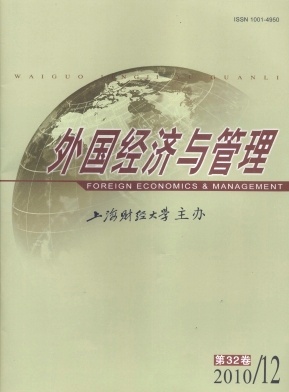快乐管理的理论溯源、研究框架构建及未来展望
外国经济与管理 2010 年 第 32 卷第 12 期, 页码:1 - 9
摘要
参考文献
摘要
快乐管理研究可以说是一个全新的研究课题,很难找到直接相关的已有研究。快乐管理是一种让员工获得幸福感的管理方式,从中可以看出幸福感是快乐管理的核心概念,因而有必要借鉴相关学科关于幸福感的研究成果。本文首先从哲学、心理学、经济学等学科进行了理论溯源,然后通过回顾管理学本身的发展历史来探寻快乐管理的管理学渊源,最后结合管理实践构建了一个快乐管理研究框架,并且指出了未来研究的发展方向。
[1]李晋,李晏墅.快乐管理:管理模式新探索[N].光明日报,2008-1-15:8.
[2]Lloyd,B,and Bridges,W.The end of the job[J].International Journal of Career Management,1995,7(2):29-33.
[3]Belbin,R M.Changing the way we work[M].Oxford,UK:Butterworth-Heinemann,1997.
[4]Waterman,A S.Two conceptions of happiness:Contrasts of personal expressiveness(eudai monia)and hedonic enjoyment[J].Journal of Personality and Social Psychology,1993,64(4):678-691.
[5](德)马克思.1844年经济学哲学手稿[M].北京:人民出版社,2002.
[6]Ryff,C D,and Keyes,C L M.The structure of psychological well-being revisited[J].Journal of Personality and Social Psychology,1995,69(4):719-727.
[7]Diener,E,Eunkook,MS,and Richard,E.Subjective well-being:Three decades of progress[J].Psychology Bulletin,1999,125(2):276-302.
[8]Diener,E.Subjective well-being:The science of happiness,and a proposal for a national index[J].American Psychologist,2000,55(1):34-43.
[9]Seligman,ME,and Csikszent mihalyi,M.Positive psychology:Anintroduction[J].American Psychologist,2000,55(1):5-14.
[10]Easterlin,R.Does economic growthi mprove the humanlot?Some empirical evidence[A].in David,P,and Reder,M(Eds.).Na-tions and households in economic growth:Essays in honor of Moses Abramovitz[C].New York:Academic Press,1974:89-125.
[11]Myer,D G.The pursuit of happiness:Who is happy and why[M].New York:Avon,1993.
[12]Goodstein,L D,and Burke,W.Creating successful organization change[J].Organizational Dynamics,1991,19(4):5-17.
[13]Andrews,F M,and Withey,S B.Social indicators of well-being:Americans’perceptions of life quality[M].New York:Plenum,1976.
[14]Locke,E A.The nature and causes of job satisfaction[A].in Dunnette,M D(Ed.).Handbook of industrial and organizationalpsychology[C].Chicago:Rand McNally,1976.
[15]Porter,L,and Steer,R.Organizational work and personal factors in employee turnover and absenteeism[J].Psychology Bulletin,1973,80(2):151-176.
[16]Kalleberg,A L.Work values andjob rewards:Atheory of job satisfaction[J].American Sociological Review,1977,42(1):124-143.
[17]Robbins,S P.Management[M].Englewood Cliffs:Prentice Hall Inc.,1992.
[2]Lloyd,B,and Bridges,W.The end of the job[J].International Journal of Career Management,1995,7(2):29-33.
[3]Belbin,R M.Changing the way we work[M].Oxford,UK:Butterworth-Heinemann,1997.
[4]Waterman,A S.Two conceptions of happiness:Contrasts of personal expressiveness(eudai monia)and hedonic enjoyment[J].Journal of Personality and Social Psychology,1993,64(4):678-691.
[5](德)马克思.1844年经济学哲学手稿[M].北京:人民出版社,2002.
[6]Ryff,C D,and Keyes,C L M.The structure of psychological well-being revisited[J].Journal of Personality and Social Psychology,1995,69(4):719-727.
[7]Diener,E,Eunkook,MS,and Richard,E.Subjective well-being:Three decades of progress[J].Psychology Bulletin,1999,125(2):276-302.
[8]Diener,E.Subjective well-being:The science of happiness,and a proposal for a national index[J].American Psychologist,2000,55(1):34-43.
[9]Seligman,ME,and Csikszent mihalyi,M.Positive psychology:Anintroduction[J].American Psychologist,2000,55(1):5-14.
[10]Easterlin,R.Does economic growthi mprove the humanlot?Some empirical evidence[A].in David,P,and Reder,M(Eds.).Na-tions and households in economic growth:Essays in honor of Moses Abramovitz[C].New York:Academic Press,1974:89-125.
[11]Myer,D G.The pursuit of happiness:Who is happy and why[M].New York:Avon,1993.
[12]Goodstein,L D,and Burke,W.Creating successful organization change[J].Organizational Dynamics,1991,19(4):5-17.
[13]Andrews,F M,and Withey,S B.Social indicators of well-being:Americans’perceptions of life quality[M].New York:Plenum,1976.
[14]Locke,E A.The nature and causes of job satisfaction[A].in Dunnette,M D(Ed.).Handbook of industrial and organizationalpsychology[C].Chicago:Rand McNally,1976.
[15]Porter,L,and Steer,R.Organizational work and personal factors in employee turnover and absenteeism[J].Psychology Bulletin,1973,80(2):151-176.
[16]Kalleberg,A L.Work values andjob rewards:Atheory of job satisfaction[J].American Sociological Review,1977,42(1):124-143.
[17]Robbins,S P.Management[M].Englewood Cliffs:Prentice Hall Inc.,1992.
引用本文
李晋, 李晏墅. 快乐管理的理论溯源、研究框架构建及未来展望[J]. 外国经济与管理, 2010, 32(12): 1–9.
导出参考文献,格式为:





 5897
5897  752
752

